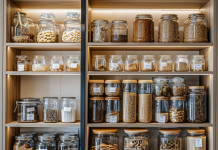The way you use your devices today has a big impact on how they work tomorrow. Help your devices last longer by eliminating these bad habits.
Most homes are equipped with a variety of appliances that make it easier and more efficient for us to do our daily tasks. Freezers and refrigerators store food, stoves and ovens cook it, and appliances like dishwashers and garbage disposals make cleanup easier. In turn, we clean and maintain these appliances to keep them in top condition. However, many of us have bad habits that can damage our appliances.
These bad habits that we perpetuate are not intentional. They are things we do when we are in a hurry or tired, without thinking about the negative impact our behavior can have on the control panels, seals and other components of the appliances. To make sure they will work well when you need them, avoid these routines that can kill your appliances, then make an effort to change your problematic practices
1. Using Hot Water in Your Garbage Disposal

It may seem counterintuitive, but hot water should not be used to clean up kitchen waste in the sink. When running the garbage disposal to grind food, use cold water instead. Hot water melts grease and fats, which will only clog the disposer’s pipes and cause mechanical damage.
2. Leaving Coins in Your Pockets

Carefully check all pockets for bills and coins before putting pants in the washer. Loose coins can damage the drum and get lodged in nooks and crannies, causing a jam and costly repair.
3. Overfilling the Freezer

It’s true that a full freezer works more efficiently than an empty one, but there can be too much of a good thing. Overfilling the freezer can block vents, restrict cold air flow and overload your refrigerator’s condenser, which can lead to a breakdown.
4. Overloading the Washing Machine

It’s tempting to fill the washer to the brim as laundry builds up, but don’t do it. An overloaded washer puts excessive pressure on the bearings, misaligns the drum, and can result in a call for washer repair.
5. Leaving Spills in the Oven

Spills are a natural by-product of cooking. Anything spilled in your oven should be cleaned up immediately, as it could damage the heating coils and lead to costly repairs.
Pro tip: use a silicone oven liner on the bottom rack of the oven to catch spilled liquids. This will make cleaning the oven easier and less time consuming.
6. Letting Lint Build Up in Your Dryer

Remember to clean the lint filter on your dryer after each load. If you don’t, your machine will be much less efficient and less safe to use. Lint that gets clogged in the exhaust hose can cause a fire.
7. Using Soap to Clean Your Gas Range Burners

Avoid cleaning the burners on your gas range with soap. This can lead to corrosion and clog the ignition hole, causing your burners to light slowly or not at all. Instead, mix water and baking soda to create a paste, then apply a thin layer of the paste to the burners and caps. Leave the paste on for 15 to 30 minutes, then use a toothbrush or scrub brush to clean the burners. For more cleaning options, read your manual and follow the manufacturer’s instructions for cleaning.
8. Placing Sharp Objects in the Dishwasher

Avoid putting sharp objects in the dishwasher. Even if you put them in a cutlery basket with the sharp ends up, you can dull knife blades and damage the racks. Any nicks in the vinyl coating of the racks will cause rust, which will stain your dishes until you replace the dishwasher.
9. Using Cast Iron on Your Ceramic Cooktop

The bottom of a cast iron pan is rough and can easily scratch a smooth ceramic cooktop. That’s why it’s best to avoid using uncoated cast iron pans. For all pots and pans, be sure not to drag them across the stove, but rather pick them up and lift them onto the burners.
10. Allowing Grime to Linger on the Fridge Gasket

Refrigerator doors are equipped with a rubber gasket that runs along the outside edge of the door. This gasket seals the door when it is closed. However, over time, the gasket can become clogged and accumulated dirt can prevent the door from sealing. This poor seal allows cold air to escape from the refrigerator, reducing the cooling efficiency of the unit and forcing it to work harder to compensate. This strain can eventually cause the compressor to fail, resulting in a costly repair. Don’t wait for the worst to happen. Instead, clean the rubber seal with soap and warm water, and be sure to do so regularly.
11. Mistreating the Microwave Door

Microwave oven doors are often slammed shut, pulled open while the appliance is still running, or even pushed open with an elbow when your hands are full. Rough closures wear out the door’s locking mechanism and can cause it to break, and pulling the door open while the appliance is on can end up blowing a safety fuse.
To avoid a premature microwave repair or replacement, slow down a bit and stop to think before you act. Instead of elbowing your way to the door, place items on the table first. Wait until the microwave is finished before trying to open it. A little patience will extend the life of your appliance.










